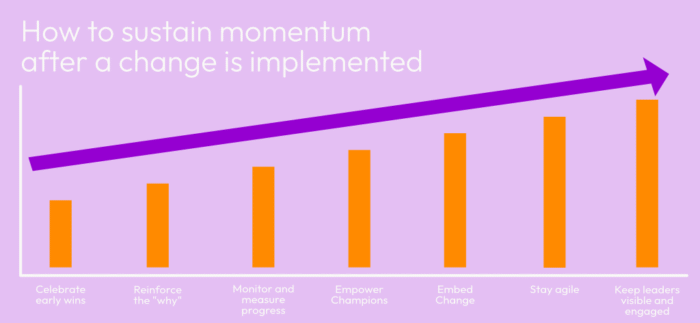Implementing change within an organisation is often seen as the finish line, but in reality, it’s just the beginning. Whether you’re rolling out a new system, restructuring a department, or driving cultural transformation, sustaining momentum after the initial implementation is critical to ensuring long-term success.
Too often, organisations experience a sharp decline in energy and engagement once a change initiative is “done.” This post-change dip can erode early gains and lead to regression. So how do you keep the momentum alive? Let’s explore some essential strategies.
1. Celebrate Early Wins, But Don’t Declare Victory Too Soon
Recognising progress is a powerful motivation tool. Celebrating early wins helps validate the effort and reinforces the belief that change is working. However, it is important not to frame these milestones as the endpoint. Keep the message clear: “This is just the beginning.”
Here’s a tip:
Host a team retrospective or town hall (an event where leaders engage directly with employees) to reflect on achievements and preview the road ahead. Pair recognition with a renewed call to action.
2. Reinforce the “Why” Behind the Change
Over time, it’s natural for people to forget why a change was necessary in the first place. Reiterate the purpose regularly to keep it fresh and relevant.
Here’s a tip:
Tie the change back to broader organisational goals or customer outcomes. Use storytelling and real-world examples to make it stick.
3. Monitor and Measure Progress
Change fatigue can set in when people feel like their efforts aren’t making a difference. Regular tracking, feedback, and transparent reporting keep momentum alive by showing that progress is both visible and valued.
Here’s a tip:
Create a simple dashboard or update cadence to show key metrics and behavioral shifts. Celebrate progress publicly.
4. Empower Champions and Middle Managers
Change is sustained not just from the top but through those closest to day-to-day operations. Equip middle managers and internal champions with tools, talking points, and autonomy to lead.
Here’s a tip:
Hold monthly check-ins with change champions. Share success stories across teams to build a sense of shared ownership.
5. Embed Change into Culture and Processes
Lasting change becomes part of “how we do things around here.” To get there, you need to integrate new behaviors into performance reviews, training, onboarding, and operational rhythms.
Here’s a tip:
Review policies, KPIs, and team routines. Are they aligned with the new direction, or pulling people back to the old ways?
6. Stay Agile and Open to Feedback
Even the best change initiatives need tweaking. Continuous feedback loops ensure you’re adapting to what’s working and what’s not, before enthusiasm fades.
Here’s a tip:
Use surveys, focus groups, or informal check-ins to gather feedback. Show how input leads to action to reinforce trust.
7. Keep Leaders Visible and Engaged
Senior leaders must remain visible champions of the change, not just during the launch phase but long after. Their sustained engagement signals priority and commitment.
Here’s a tip:
Have leaders regularly share updates, success stories, or lessons learned via internal comms or team visits.
Final Thoughts
Sustaining momentum after a change isn’t just about keeping energy high—it’s about embedding new mindsets, systems, and behaviors into the fabric of the organisation. With the right strategies, organisations can move from short-term implementation to long-term transformation.
Change isn’t a project; it’s a process and sustaining it is where the real leadership begins.
If you are a leader of change and would like some further information or guidance, please get in touch with Good Change People today!





